小学英语《your_body》PPT课件
合集下载
《Move Your Body》Sports and Good Health PPT教学课件【精品推荐课件】
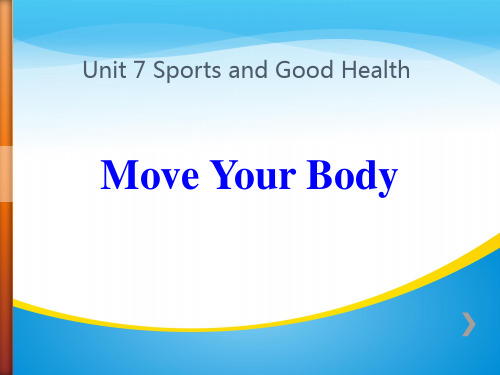
【温馨提示】 used to可以和副词always、often、 sometimes等连用,但是仍然是指过去的习 惯。如:He always used to be late for class. 他过去总是上课迟到。
【用法辨析】 与used to不同搭配的用法
be used to doing sth.
play games outdoors
play computer games
couch potato
fresh air
go for a good walk
outdoors adv. 在户外 weight n. 重量 couch n. 睡椅;长沙发椅 air n. 空气;天空 lucky adj. 幸运的;侥幸的 side n. 边;侧边
you? Did you ever help a friend? What
happened? Talk about it .
1. They used to be very active together. used to是一个固定结构,意为“过去经常,
以前常常”,其后用动词原形。它表示过去存 在某种状态或者过去的某种经常性、习惯性的 行为或者动作,并意味着这种动作目前已经不 存在,所以它只表示过去,不表示现在。含 used to的句式结构如下:
Look at the following pictures and discuss the two questions with your partner: 1. Do you like staying home or going out? 2. Which do you think is good for you?
walk. ( ) T
3 Fill in the blanks with the correct forms of the phrases in the box.
小学英语学习your body
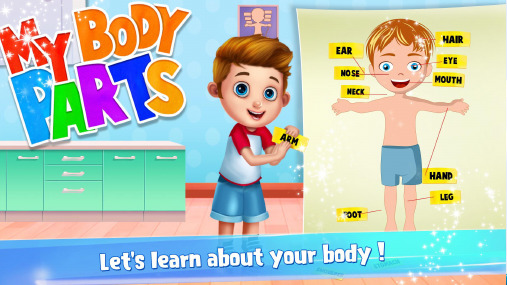
What's missing 什么部位不见了?
Hit an egg 砸彩蛋 7个彩蛋中有一个礼物看
谁好运头 没砸中要读出里面的英文单词并说出
2
中文才能继续砸
1 arm
礼物 7
4
hand
hair
5
foot
3 head
6
body
Let's chant
I have back hair,hair hair hair I have a head,head head head
I have a _h_e_a_d__.
hair
I have black hair.
arm
I have t_w_o_a_r_m_s____.
hand
I have _tw__o_h_a_n_d_s_.
leg
I have __tw_o__le_g_s __.
foot
I have _t_w_o__fe_e_t___.
eye face
nose
ear
mouth
New words:学习新单词
body
身体
head
头
hair
头发
arm
胳膊
hand
手
leg
腿
foot(feet)
脚
Let's play a game 玩游戏 我说你摸
I say you touch
body
I have a _bo_d_y__.
head
I have two arms,arms arms arms I have two hands,hands hands hands
I have a body,body body body I have two legs,legs legs legs
人教版三年级英语《My body》PPT课件
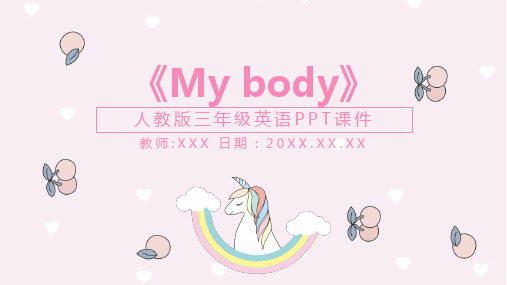
点击添加标题文字
ADD YOUR TITLE HERE.
Look,
guess and answer.
Who are they? Where are they? What are they doing?
点击添加标题文字
ADD YOUR TITLE HERE.
Summary
如何询问和回答“你怎么 了?”? What’s the matter? My foot/leg/head/ hurts.
beautiful
How beautiful the bird is !
点击添加标题文字
ADD YOUR TITLE HERE.
1. What a pretty girl she is ! 2. ____ _____ the girl is ! 3. 2. How difficult the questions are ! 4. ____ _____ ______ they are . 5. 3. How big the factory is ! 6. _____ _____ big factory ____ ____ !
nice
点击添加标题文字
ADD YOUR TITLE HERE.
1 . A is 10 years old , B is 11 years old . A is ________ than B . 2 . Tom is 160 cm , lucy is 170 cm . - Luvy is ________ than tom .
点击添加标题文字
ADD YOUR TITLE HERE.
1、意思相同的感叹句,既可以用how来引导,也可以用what来引导。如: How interesting the boy is ! What an interesting boy he is !
《Move Your Body》Sports and Good Health PPT教学课件

体重增加;长胖
put on weight
出去
couch potato
沙发土豆
in the sun 在阳光下 get out 站在某人一边;支持某人
on one’s side
1 Listen to the statements and number the pictures.
1
3
2
5
4
2 Read the lesson and write true (T) or false (F).
①肯定句:主语+used to+动词原形+其他。如:I used to play with my friends after school.过去放学后我 常常和朋友们一起玩。 ②否定句:主语+didn't+use/usedn't to+动词原形+ 其他。如:You didn't use to like pop songs.你过去不喜 欢流行歌曲。 ③一般疑问句:Did+主语+use to+动词原形+其他? 如:Did your sister use to be quiet?你的妹妹过去很安 静吗?
1. Tim used to be very active. ( T) 2. Ben watches too much TV and plays too
much computer games. ( F) 3. Ben and Tim are both putting on weight. ( ) 4. TimF finds a letter at his desk. ( ) 5. Ben and Tim will meet and goF for a good
computer games. It’s bad for you.
put on weight
出去
couch potato
沙发土豆
in the sun 在阳光下 get out 站在某人一边;支持某人
on one’s side
1 Listen to the statements and number the pictures.
1
3
2
5
4
2 Read the lesson and write true (T) or false (F).
①肯定句:主语+used to+动词原形+其他。如:I used to play with my friends after school.过去放学后我 常常和朋友们一起玩。 ②否定句:主语+didn't+use/usedn't to+动词原形+ 其他。如:You didn't use to like pop songs.你过去不喜 欢流行歌曲。 ③一般疑问句:Did+主语+use to+动词原形+其他? 如:Did your sister use to be quiet?你的妹妹过去很安 静吗?
1. Tim used to be very active. ( T) 2. Ben watches too much TV and plays too
much computer games. ( F) 3. Ben and Tim are both putting on weight. ( ) 4. TimF finds a letter at his desk. ( ) 5. Ben and Tim will meet and goF for a good
computer games. It’s bad for you.
小学英语your-body-课件
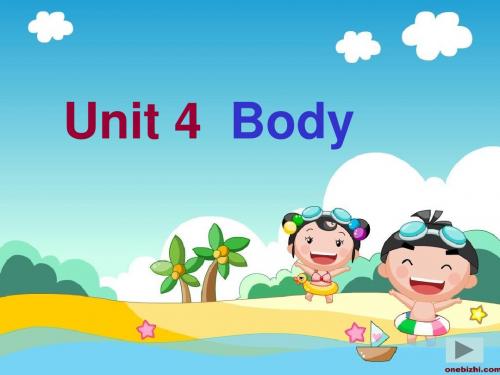
head head 头 mouth mouth 嘴 leg leg 腿
face face 脸 hand hand 手 foot foot 脚
耳朵 耳朵 ear 鼻子 鼻子 nose 身体 身体 body
眼睛 眼睛 eye 胳膊 胳膊 arm body body body
* Look, read, and match *(看,读,连)
Nose nose , touch your nose Foot foot , touch your foot Eye eye , close your eyes
eye eye s
eye
two eyes .
ear
two ear s .
. two hands
s two arm
. two legs
foot
. two feet
How to show the parts of the body ?
如何指示身体部位?
Say and show 说一说 指一指
1. (Look!) This is my head/…/body/…/foot. 2. I have a … .
head face nose mouth body 3. I have two … . ears eyes arms hands legs feet
* This is 后面用名词的单数。 ** I have a 后面用名词的单数。 ***I have two后面用名词的复数。
同学们,你会用This is 或者 I have填空吗?
1. _T_h_is__is_ my arm. 2. _I_h_a_v_e_ two eyes. 3. _I_h_a_v_e_a nose. 4. _T_h_i_s_i_s_ your head. T_h_i_s_i_s__ my foot.
《Move Your Body》Sports and Good HealthPPT幻灯片

【名校课堂说课稿】《Move Your Body》Sports and Good Health课堂课件-最新版本PPT导学课件
【名校课堂说课稿】《Move Your Body》Sports and Good Health课堂课件-最新版本PPT导学课件
Lesson 40 Move Your Body
【名校课堂说课稿】《Move Your Body》Sports and Good Health课堂课件-最新版本PPT导学课件
【名校课堂说课稿】《Move Your Body》Sports and Good Health课堂课件-最新版本PPT导学课件
Lesson 40 Move Your Body
Lesson 40 Move Your Body
课堂互动探究
词汇点睛
●1 used to 过去常常
[观察] They used to be very active together. 他们过去在一起的时候很活跃。
[探究] used to do sth.表示“过去常常做某事”,表示过去经 常发生的动作或存在的状态,而现在却不再发生。其中的to 是不定式符号,不是介词,所以其后接__动__词__原__形____(动词原 形/动名词)。
[辨析] be used to doing sth.与be used to do sth.
意为“习惯于做某事”,其中的to是 be used to doing sth.
_____介___词,后接动词时要用动名词。 表示“被用来做某事”,是动词use
be used to do sth. 的被动语态结构。
【名校课堂说课稿】《Move Your Body》Sports and Good Health课堂课件-最新版本PPT导学课件
小学英语yourbody
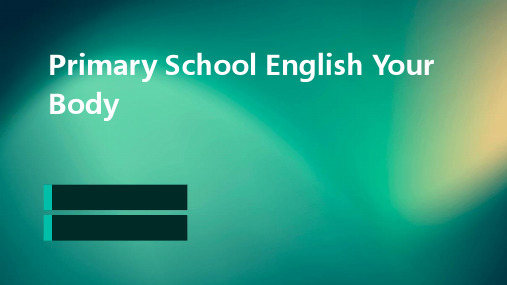
Students will learn about healthy lifestyle habits, such as proper diet, exercise, and sleep, and how to incorporate them into their daily routines
They will also gain an understanding of the importance of preventive health and regular check ups to maintain good health
Language accuracy
The students' use of English language was generally accurate, but there is room for improvement in their promotion and introduction
Next class preview
The students were actively involved in class activities, showing interest in the topic
Practice and application
Through various activities, the students have the opportunity to practice and apply their knowledge of body parts, functions, and movement verbs
02 Body parts vocabulary
Head and face
Head
The top part of the body that contains the brain and sense organs
